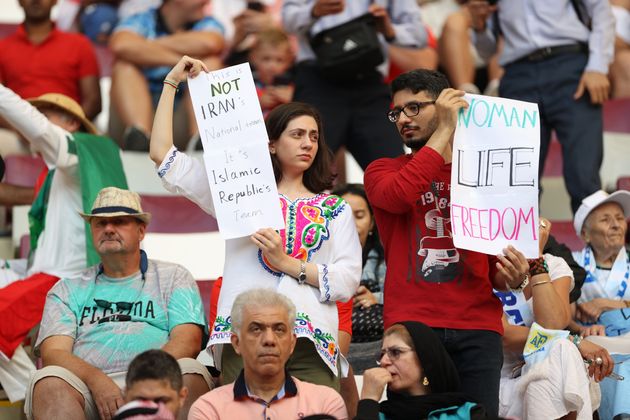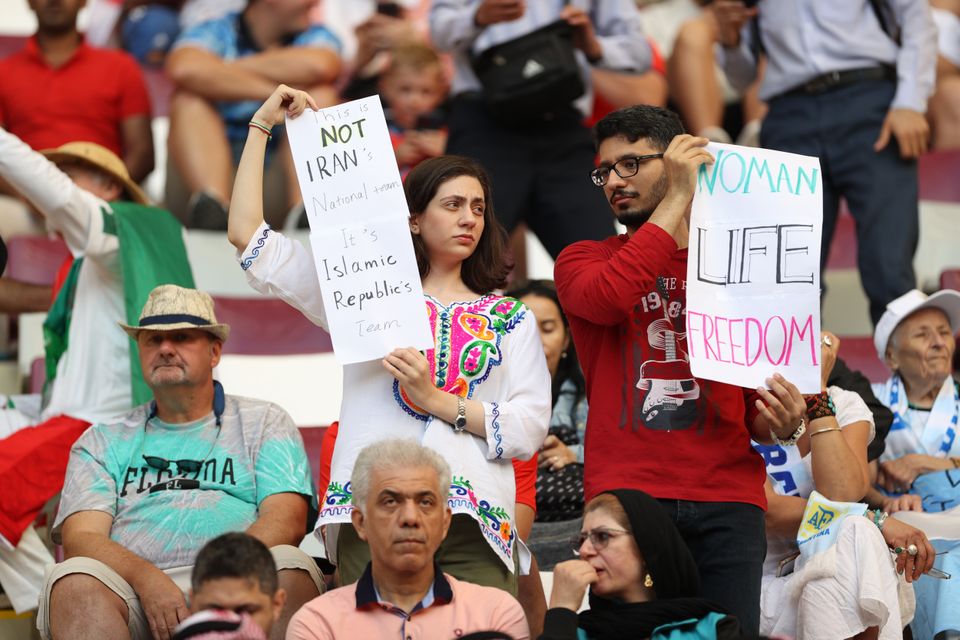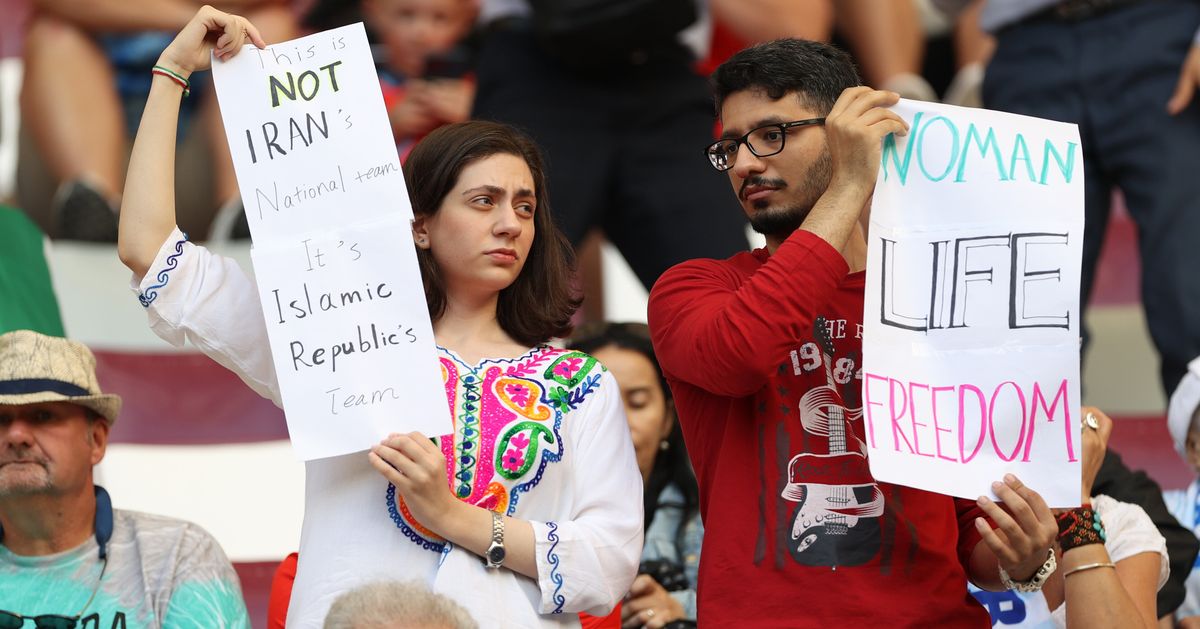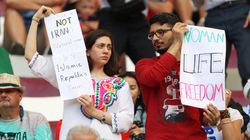The 2022 World Cup in Qatar has been mired in controversy from the moment it was announced the tiny Persian Gulf country would be hosting the tournament 12 years ago. But while the football has now started, the negative headlines have yet to subside.
In the build-up, thousands of migrant workers died in the nation’s extreme heat and construction accidents building the stadiums for what The Times called the “biggest sportswashing coup” in history – referring to nations that host sporting events to distract from their human rights records.
Advertisement
At the last minute, all alcohol was banned in the stadiums – not surprising in a Muslim nation, but the wealthy can down whatever they want in their luxury stadium suites. What’s more, prior World Cup hosts Brazil and Russia also prohibited drinking in stadiums – but governing body FIFA successfully pressured both countries to lift those rules for the 2014 and 2018 tournaments respectively.
In a bizarre speech on Saturday, FIFA head Gianni Infantino defended Qatar’s human rights record, as he called Europeans hypocrites for complaining about it. He indicated he knew just how the oppressed in Qatar felt because he had been bullied as a boy – in Switzerland – for having red hair and freckles.
All this before a ball was kicked. And little more than 24 hours since the opening game, the action on the pitch has yet to provide much of a distraction.
1. Iran team send a message home
Sebastian Frej/MB Media via Getty Images
Advertisement
Against the backdrop of two months of protests in Iran, the country’s players didn’t sing their national anthem and didn’t celebrate their goals in the match against England – a brave act of solidarity given the repercussions they could receive from the hardline regime at home.
The protests in Iran were sparked by the death of a young woman in the custody of the morality police, and marks one of the boldest challenges to Iran’s clerical leaders since the 1979 Islamic Revolution. It has resulted in the deaths of at least 419 people, according Human Rights Activists in Iran, a group that has been monitoring the protests.
Meanwhile, in the stands, many Iranian fans showed solidarity with the protest movement – holding signs and flags at odds with the image the tournament hosts want to project.
Before international matches, Iran’s players usually sing the national anthem with the right hands on their heart. On Monday they stood silently, their arms draped around each other’s shoulders, prompting Iran’s state TV to cut from a close-up of the players’ faces to a wide shot of the pitch.
Advertisement
During the match, the players didn’t celebrate their two goals, something that has become common in Iranian league matches since the protests began.
2. Armband showdown
A stand-off over armbands is another flashpoint organisers of the tournament would rather have avoided.
The football associations of England and Wales, along with other European countries, announced they would not wear the rainbow-coloured One Love anti-discrimination armband in their World Cup matches after FIFA threatened them with sporting sanctions at the last minute. They feared a yellow card being issued for their captain.
Advertisement
Step forward BBC broadcaster Alex Scott.
The former Lioness defender was seen wearing a One Love armband on air as she presented the the BBC’s coverage in Doha.
The 38-year-old former wore the anti-discrimination symbol as England played Iran in their opening match.

Scott received praised for wearing the band from many.
Pride in Football, which represents LGBT+ fan groups in the UK, wrote on Twitter: “England may not be wearing the #OneLove armband, but @AlexScott is right now on BBC.
“This is more than just LGBTQ+ rights, this is Human Rights.”
Meanwhile, comedian Joe Lycett continues to call out David Beckham and his ambassadorship deal with Qatar.
Advertisement
3. Empty seats
Even the basic logistics were not running smoothly.
Several fans heading to the Enngland v Iran fixture endured ticketing problems as they attempted to enter the stadium, with some missing part of the game.
Concerns were also raised about the availability of food within the stadium and at the main fan park in central Doha.
Catherine Ivill via Getty Images
With the 4pm local time kick-off approaching, some supporters were frantically refreshing the official ticketing mobile app on their phones in a bid to have their QR code load.
This left them enduring some stressful and frustrating moments, with a group of England fans also seen arguing with officials as they kept being told entry to the queue was closed and repeatedly moved down to another entrance.
Advertisement
4. Rainbow bucket hats confiscated
First it was armbands, then it was headwear.
Female Wales supporters wearing rainbow bucket hats had them confiscated in Qatar ahead of the clash with the USA, according to fans.
Wales’ Rainbow Wall, a group of LGBTQ+ supporters, said male supporters wearing the hats were allowed to keep them but the items were taken from women.
Former Wales international footballer Laura McAllister, now a professor at Cardiff University, wrote on Twitter: “So, despite fine words from @FIFAWorldCup before event, @Cymru rainbow bucket hats confiscated at stadium, mine included.
“I had a conversation about this with stewards – we have video evidence. This #WorldCup2022 just gets better but we will continue stand up for our values.”
Advertisement
The bucket hat has become the must-have accessory for Wales fans over the past decade.
The yellow, green and red hats are worn in their thousands by the so-called Red Wall, with a rainbow version also produced.
Wales’ Rainbow Wall wrote: “Our rainbow bucket hat. We are so proud of them, but news on the ground tonight is our welsh female supporters wearing them in #Qatar are having them taken off them, not the men, just women.”
5. Qatar embarrassed on the pitch
On the pitch, things weren’t much better for the hosts.
Despite more than a decade of hothousing players for this moment, Qatar’s national team lost 2-0 in the tournament curtain-raiser against Ecuador on Sunday before more than 67,000 soccer fans.
It was the first time in the 92 years of the World Cup’s existence that the host nation’s team failed to win its opening game.







 (@Ava_wfc)
(@Ava_wfc) 
